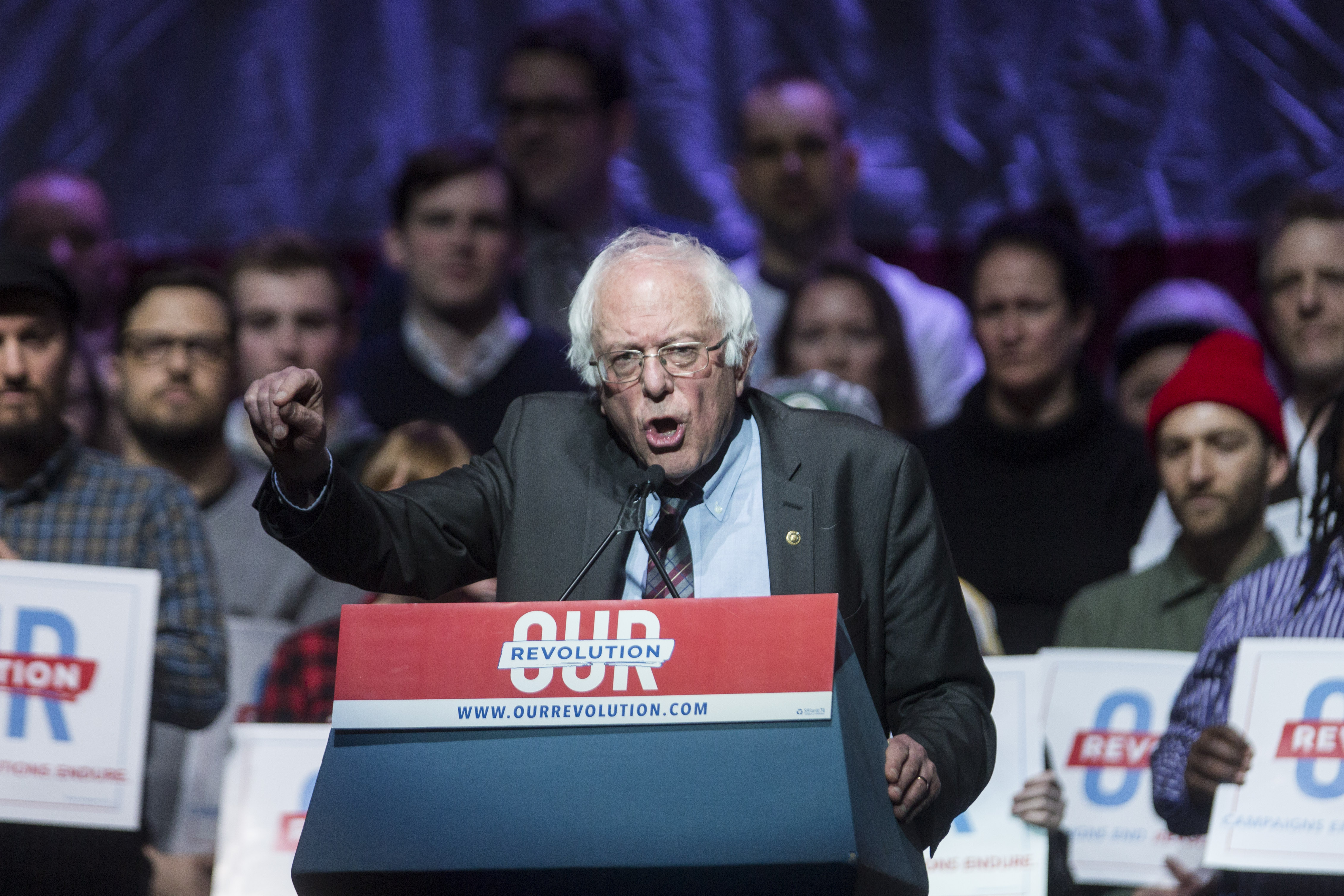Is Bernie Sanders helping or hurting the Democratic Party?
You might think the most important thing for Democrats to do is fight Trump and the radicalism that has taken over the GOP. Sanders disagrees.


Bernie Sanders is not a party man. He's not even a Democrat. Despite having run for the Democratic nomination for president, he adamantly retains his status as an independent. Yet there's no denying that Sanders continues to have an effect on the Democratic Party, and right now he and Tom Perez, the chair of the DNC, are traveling the country on a "unity tour" that seems to be displaying something less than perfect unity. So what effect is Sanders really having on the party?
He generated some controversy on Wednesday when he explained his lack of enthusiasm for Georgia congressional candidate Jon Ossoff, who the day before had fallen just short of the 50 percent vote he needed to avoid a runoff in a special election. "If you run as a Democrat, you're a Democrat," Sanders told The Wall Street Journal. "Some Democrats are progressive and some Democrats are not." Asked directly whether Ossoff is a progressive, Sanders responded, "I don't know."
It was practically a shiv in Ossoff's back, but what's really mysterious is why Sanders did it. He could have just said something like, "I look forward to talking to him about the issues I care about, but he's a hell of a lot more progressive than the Republican he's facing in the runoff." At the very least, given that this special election captivated the political world and was seen as a golden opportunity to deal Donald Trump and the GOP a major defeat, one might think that at least Sanders would have figured out whether Ossoff measures up to his ideological standards.
The Week
Escape your echo chamber. Get the facts behind the news, plus analysis from multiple perspectives.

Sign up for The Week's Free Newsletters
From our morning news briefing to a weekly Good News Newsletter, get the best of The Week delivered directly to your inbox.
From our morning news briefing to a weekly Good News Newsletter, get the best of The Week delivered directly to your inbox.
One way to interpret his reticence is that Sanders is a hedgehog, not a fox. In the philosopher Isaiah Berlin's metaphor, the fox knows many things, but the hedgehog knows one thing. Sanders knows that the grip of millionaires and billionaires on our national life has to be loosened, and agreeing with him on that is the beginning and end of what he considers "progressive." Which is why he could dismiss Ossoff and then head off to campaign for Heath Mello, a candidate for Omaha mayor who as a state legislator sponsored multiple anti-abortion bills and was endorsed by Nebraska Right to Life. That, apparently, doesn't disqualify you from being a progressive.
On the other hand, it's not clear precisely why Sanders thinks Ossoff is insufficiently opposed to the plutocrat class; perhaps he wouldn't vouch for the congressional candidate because he wasn't a vocal Sanders supporter. Far be it from me to suggest that Sanders would be moved by such petty considerations, but it wouldn't make him any different from many other politicians.
And after all, that's what he is: a politician. There's no shame in it, but like most politicians, Sanders pursues his own angle on things and has his own personal and ideological goals. And he seems to see himself as a guardian of an ideological purity, but of a narrow kind, one in which economic issues trump all others.
As for Sanders' unity tour with Perez, it seems like it's mostly an opportunity for him to deliver ultimatums to the party:
A free daily email with the biggest news stories of the day – and the best features from TheWeek.com
Mr. Sanders told a Maine crowd Monday night that "our job is to radically transform the Democratic Party." He put the onus on Mr. Perez and other party leaders to adopt his aggressive power-to-the-people worldview."It can't be just symbolic, it has got to be real," Mr. Sanders said. "It has got to be that those ideas are allowed to become the dominant theme of the Democratic Party, and that's the choice that Democrats are going to have to make." [The Wall Street Journal]
Sanders has every right to take what is essentially a semi-hostile stance toward the Democratic Party, one that says that those Democrats who meet his test of economic ideology are worthy and those who don't should be dismissed with a wave of the hand. That's what he thinks will produce the best substantive outcomes in the long run. He might be right.
But in the meantime, one might ask whether he's bringing people into the Democratic Party or communicating to those who agree with him on issues that they should remain outside it, and only work to elect Democrats who win Bernie Sanders' favor. One might argue on the other side that the most important thing for Democrats to do is fight Trump and the radicalism that has taken over the GOP. It's hard to argue that supporting a Democrat for mayor who doesn't believe in reproductive rights accomplishes that goal, but supporting a Democratic House candidate who hasn't sufficiently demonstrated his antipathy to Goldman Sachs doesn't.
But that's Bernie's thing — always has been, always will be. He's never going to be a Democrat, because he has built his identity on being the guy who tells you that Democrats are a bunch of sellouts and only when the party remakes itself in his image will it succeed. You can agree with him on most issues or even every issue, but if you think the Democratic Party is the best available vehicle to accomplish progressive goals, you're going to find yourself at odds with him.
Paul Waldman is a senior writer with The American Prospect magazine and a blogger for The Washington Post. His writing has appeared in dozens of newspapers, magazines, and web sites, and he is the author or co-author of four books on media and politics.
-
 Are pesticides making florists sick?
Are pesticides making florists sick?Under the Radar Shop-bought bouquets hide a cocktail of chemicals
-
 Will Trump’s 10% credit card rate limit actually help consumers?
Will Trump’s 10% credit card rate limit actually help consumers?Today's Big Question Banks say they would pull back on credit
-
 3 smart financial habits to incorporate in 2026
3 smart financial habits to incorporate in 2026the explainer Make your money work for you, instead of the other way around
-
 The billionaires’ wealth tax: a catastrophe for California?
The billionaires’ wealth tax: a catastrophe for California?Talking Point Peter Thiel and Larry Page preparing to change state residency
-
 Bari Weiss’ ‘60 Minutes’ scandal is about more than one report
Bari Weiss’ ‘60 Minutes’ scandal is about more than one reportIN THE SPOTLIGHT By blocking an approved segment on a controversial prison holding US deportees in El Salvador, the editor-in-chief of CBS News has become the main story
-
 Has Zohran Mamdani shown the Democrats how to win again?
Has Zohran Mamdani shown the Democrats how to win again?Today’s Big Question New York City mayoral election touted as victory for left-wing populists but moderate centrist wins elsewhere present more complex path for Democratic Party
-
 Millions turn out for anti-Trump ‘No Kings’ rallies
Millions turn out for anti-Trump ‘No Kings’ ralliesSpeed Read An estimated 7 million people participated, 2 million more than at the first ‘No Kings’ protest in June
-
 Ghislaine Maxwell: angling for a Trump pardon
Ghislaine Maxwell: angling for a Trump pardonTalking Point Convicted sex trafficker's testimony could shed new light on president's links to Jeffrey Epstein
-
 The last words and final moments of 40 presidents
The last words and final moments of 40 presidentsThe Explainer Some are eloquent quotes worthy of the holders of the highest office in the nation, and others... aren't
-
 The JFK files: the truth at last?
The JFK files: the truth at last?In The Spotlight More than 64,000 previously classified documents relating the 1963 assassination of John F. Kennedy have been released by the Trump administration
-
 'Seriously, not literally': how should the world take Donald Trump?
'Seriously, not literally': how should the world take Donald Trump?Today's big question White House rhetoric and reality look likely to become increasingly blurred
